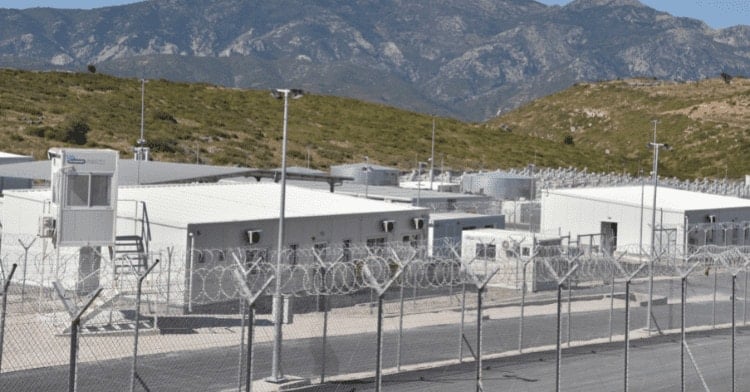Before last May’s election in Greece, the returning prime minister claimed his ‘firm but fair’ policy on people movement worked. Far from it.
Samos, a mile from the Turkish coastline, has become known as one of the five ‘hotspots’ in the Aegean, hosting those arriving in Greece to claim asylum. The subject of episodic media attention over the last five years, on the island pushbacks, overcrowding, appalling conditions, fires, violence and lack of food and water—as well as of access to healthcare, safe shelter and educational opportunities—have put individuals’ physical and mental health at risk.
With the closure of the highly criticised Reception and Identification Centre in September 2021 and the opening in its stead of the Zervou Closed and Controlled Access Centre (CCAC), the Greek government argued it was issuing in a new approach to asylum and encampment, which would end overcrowding and ensure basic needs were met, while accelerating the asylum procedure. It said the role of such centres was to provide ‘protection and safe accommodation to third-country nationals that enter Greece without the legal requirements’. Yet the CCAC on Samos has been widely criticised for prison-like conditions—with unlawful detention in small containers behind barbed-wire fences and accusations of violence against residents—as well as broken facilities and limited access to drinking water and nutritious food.
Further deteriorated
In recent weeks the situation has deteriorated further, as arrivals have increased and the camp has exceeded its capacity; so have those on the islands of Lesvos and Leros. As in 2019, overcrowding is again a concern.
In May, in the run-up to the election which saw their right-wing party, New Democracy, returned to government, the prime minister, Kyriakos Mitsotakis, and the then migration minister, Notis Mitarakis, claimed to be ‘exceptionally proud’ of their achievements in decongesting the islands and establishing ‘a firm but fair’ migration policy. Even if this came at the expense of pushbacks banned by the 1951 Refugee Convention and mass transfers to underfunded camps on the mainland.
Indeed, the need to maintain the façade of having the situation under control seems to have led to attempts to disguise it: a non-governmental organisation reported last week that ‘overnight the nominal capacities [of the CCACs] changed without any clarification’, with that on Samos being raised from 2,040 to 3,659—an increase of nearly 80 per cent. Yet NGOs say no further accommodation has been opened nor has any real change been made which could justify this elevation.
As of late last month, there were 4,123 people inside the Samos CCAC—more than double the original capacity. NGOs, including I Have Rights, have received reports from residents that they are arbitrarily held in overcrowded containers and corridors, with more than 50 sleeping in the restaurant container. There have been further reports of new arrivals being detained for up to two weeks or even a month, without the individual-decision letter which would be required for this to be lawful—not only abrogating human rights but damaging wellbeing.
Lack of water
I Have Rights has also been informed by clients of a severe lack of access to water, provided only at irregular intervals: on some days this is 30 minutes three times a day; on others it is only once a day for an hour. Such extreme water shortages are not only intrinsically problematic but also affect hygiene and health.
According to residents and the NGOs supporting them, there are currently no laundry services in the camp—quite likely a result of the water shortages. This led last month to an outbreak of scabies and an increase in other skin conditions. Treating scabies requires the washing of all clothes and bedding at 60C. It has also been reported that distribution of new clothing, as well as hygiene items, has been delayed, so residents have no choice but to wear unclean clothes.
Meanwhile, the food in the camp has once more been criticised for poor nutritious value and lack of fresh produce. In the past the NGO Project Armonia had to step in to provide food for the most vulnerable.
Residents again report long food queues—a problem which was supposed to have been solved by the move to the CCAC—as well as insufficient quantity of food, children going hungry and a range of gastro-intestinal concerns. Another NGO, Refugee Biryani and Bananas, was told by one resident: ‘[T]here is no food, no water and we are starving.’
Industrial action
Nor is unrest confined to the residents and the NGOs voicing their concerns, in a camp funded by the European Union. Staff embarked on industrial action last month with a two-day strike across the CCACs, sparked by the current situation.
As this continues to worsen, it is important not only to draw attention to the plight of displaced people on the island. Change is also required: the rights of those seeking asylum, at Europe’s borders everywhere, demand that they be accommodated in safe, dignified and welcoming conditions—not in overcrowded detention spaces which fail to provide even the most basic necessities.






